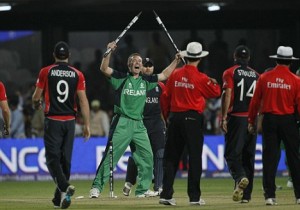
A gradual but inevitable descent into cricket-based loathing and bile.
The T20 World Cup: Something to Watch While They Find That Plane
It’s often debated as to whether or not Twenty20 should ever be played at international level. The case for the defence cites that it was introduced to the professional game as a way of attracting a more diverse, larger, audience to the game in general. If that audience is the oi oi banterific after work crowd then it’s been a success. Any Friday evening at The Oval later this year will be filled with more ‘novelty’ beer snakes and ‘ties around heads’ Rambo impressions than any game of cricket deserves.
The international game has less need for such shenanigans, with their massive sponsorship deals and central contracts paid for by all of us fools happy to part with £90 for a day in the drizzle at Lord’s. Then there are the ongoing problems with schedule congestion. It’s a common grumble in our office that potentially great Test series get cut short to fit in a two match T20 series which will inevitably end 1-1. Unless it’s England playing a team with more than one spinner.
All of the above are legitimate concerns to which there are no simple solutions, but despite this (and our general love of all things traditional) we actually quite like the T20 World Cup. Here’s why:
Length of the Tournament
All the best ICC events are completed in the time it takes to find a missing commercial airliner – it’s why everybody loves the Champions Trophy – and the World T20 is a similar beast. Three weeks, two games on most days: short, sharp, relevant. The biannual scheduling is also ideal, as too much T20 is a very bad thing. Perhaps someone should tell the BCCI.
The format isn’t perfect though. It has been tweaked again so the first week is basically an associate nation shootout with the best two teams being allowed a shot at the big boys in the second week. At least they’ve done away with the more complicated Super Six/Eight section (although the second week seems to have been branded the Super Ten despite it just being a standard group format). All of the above is an effort to integrate the associate nations and give them exposure to high level competition, which we all agree is much needed.
All the great players (and Jade Dernbach) in one place
The success or otherwise of T20 cricket is purely down to the quality of the product. This has been seen by attendance figures in England over the last two seasons. Two years ago the wet summer created a damp squib of a competition but given warm weather, flat pitches, fair pricing and good players hitting the ball into the crowd the fans will flock to the grounds (as happened in 2013). No amount of sponsors’ logos or tactical timeouts will change that equation. Perhaps someone should tell the BCCI.
The beauty of the ICC tournament window is that all the big stars will be on show over the next few weeks. Big hitters like Chris Gayle, Brendon McCullum and Aaron Finch competing against the more classical techniques of Mahela Jayawardene, Virat Kohli and Hashim Amla. T20 also tests the skills of the world’s best bowlers (and Jade Dernbach) with minimal margin for error. Cutters, slower ball bouncers, back of the hand deliveries – all will be demonstrated with varying degrees of success.
Identification with a cause
The key to a good tournament is actually caring about the teams playing, whether that be international sides, counties or little Jonny playing for the village fifth XI. We all like to be associated with a cause. You will all know that the trend to franchise type structures has been en vogue over the last few years. The Australian Big Bash seems to have been a success, although that’s probably much more thanks to flashing bails and Shane Warne’s mouth. Perhaps someone should tell the BCCI.
The South Africans have the Ram Slam with teams called Cobras, Dolphins, Titans, Warriors and so on. Even the ECB had added ‘Blast’ to their tournament name and considered including the Edgbaston Evaders or something like that. However, none of this creates an affiliation as strong as years of history. The truth is countries don’t need loud noises or stupid suffixes or colours to attract the required attention and support. But then countries don’t need millions of dollars to change hands either, so…




No Comments
Post a Comment